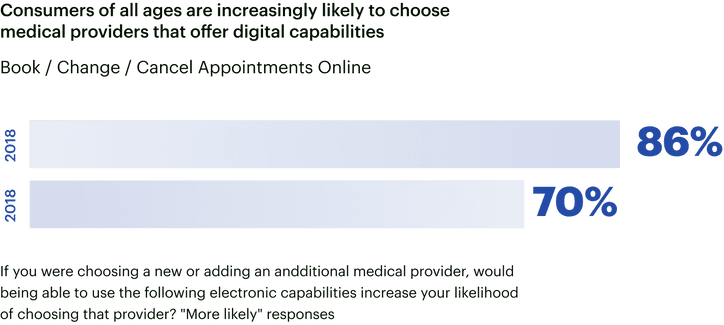Rise of Tech-Savvy Healthcare Providers
Artificial intelligence (AI) doesn’t always need to focus on technology’s most attention-grabbing aspects, like robotic surgery. The use of AI to automate basic tasks in everyday healthcare settings can improve clinic operations to a significant degree. Automations not only reduce clinician burnout by streamlining workflows but also enables healthcare providers to stay adaptable through unforeseen challenges, such as Covid-19.
Convenience from Digital Lifestyle Experiences is Increasingly Expected in Clinics
Today, the average consumer can schedule transport services via popular ride-sharing apps, book movie tickets online, and shop on digital retail platforms. Technology has become so prevalent in everyday life that being tech-savvy is the norm. In this digital age, you can expect the majority of consumers to know how to conduct SafeEntry by scanning a QR code, fulfill a contactless digital payment, or book an appointment online. In fact, research shows patients of all ages are increasingly likely to choose medical providers who have digital appointment booking capabilities.

It’s not just everyday issues in healthcare that benefit from MedTech though. When Covid-19 hit, patients looked towards technology to address safety concerns. Tech-savvy clinics could quickly apply contactless solutions to keep patients and staff safe. For example, new patients could pre-register online before stepping into the clinic, doctors could provide virtual care where suitable, and patients could settle bills via remote payment.
By now you may have noticed that this “Contactless Takeover” is changing how businesses operate, from digital food menus and cinema ticketing machines to automated payments in clinics. Growth in contactless operations—accelerated by strict safe distancing protocols—is creating a permanent change in consumer behaviour. As people become comfortable with a contactless way of life, patients will expect no less from all healthcare providers.
Normalising Virtual Care for Patients
With the risk of exposure to Covid-19, some patients remain hesitant to physically visit the clinic. Stricter safety precautions imposed on the number of visitors allowed at facilities also impact patients and their caregivers.
To overcome these challenges, both patients and doctors are embracing telemedicine to facilitate digital consultations. Clinics that use Plato conduct over 1,000 teleconsultations each week via PlatoConnect. Doctors can use PlatoConnect on any device to establish fast, uninterrupted and secure communication with their patients. Healthcare providers can safely follow up on their patients’ progress, discuss concerns, or go over medical results using this virtual platform.
Telemedicine not only frees up medical resources and improves triaging, but also protects healthcare providers, patients, and caregivers against Covid-19. Since the Covid-19 pandemic began, GPs have been one of the fastest to transition to teleconsultations. Even doctors who had been sceptical about video consultations were won over after they realised how well the technology worked.
Weaving technology into your practice doesn’t mean eliminating the human touch—virtual clinics enable patients to meet their healthcare provider face-to-face irrespective of geographic barriers. While virtual care cannot fully replace an in-person visit, it is appropriate for monitoring patients’ health and ensuring they adhere to treatment plans.
Automate to Relieve Administrative Burden
According to the Medscape Physician Compensation Report 2020, doctors spend on average 15.6 hours per week on paperwork and admin tasks. Now imagine if this time could be dedicated to patient care instead?
Plato gives clinics the power of one more staff member by automating work at every stage of the patient journey. Front desk automation such as online appointment booking and self-registration can save staff up to over two hours per day*. If you have a well-designed and flexible EMR, you can save doctors and nurses from nearly six hours* of administrative processing. If a clinic receives their lab and radiology results directly in their software system, they don’t have to do any manual scanning. Integrated payment solutions like PlatoPay eliminate billing errors and double data entry. Small automations at every stage amount to a lot. At the end of the day, the right software enables healthcare providers to focus on their patients, instead of admin p rocesses.
Advice for Doctor-preneurs
The first few years are tough. Invest in a software that eases the journey.
The first six months to a year tend to make a practice - this is when you are building your patient base. Choosing the right software can make it easier to increase patient volume, smooth marketing processes, and give patients a stronger first impression, building your practice faster. Each month, your clinic will pay for equipment, rent, licenses and staff, while waiting for revenue to catch up to costs. Even though your instinct during this period might be to cut costs, making the right investments can help your clinic grow revenue faster to reach your break-even point.
Whether you want to run a small practice or scale, your software will play a role in shaping your business.
A clinic’s software choice can facilitate or impede growth. Imagine you want to set up an online store for your practice, open a new clinic location, or link your clinic with a patient app. Does your software allow for integration? Does it connect different clinic locations together? Or, in the long term, will it slow/impede growth?
The software you choose also determines the amount of manual work your staff will undertake. Manual work can increase staff unhappiness and cut into their time with and energy for patients. The best software looks to the future and are constantly thinking about what automation to put in place next. They view problems as opportunities and are constantly improving.


